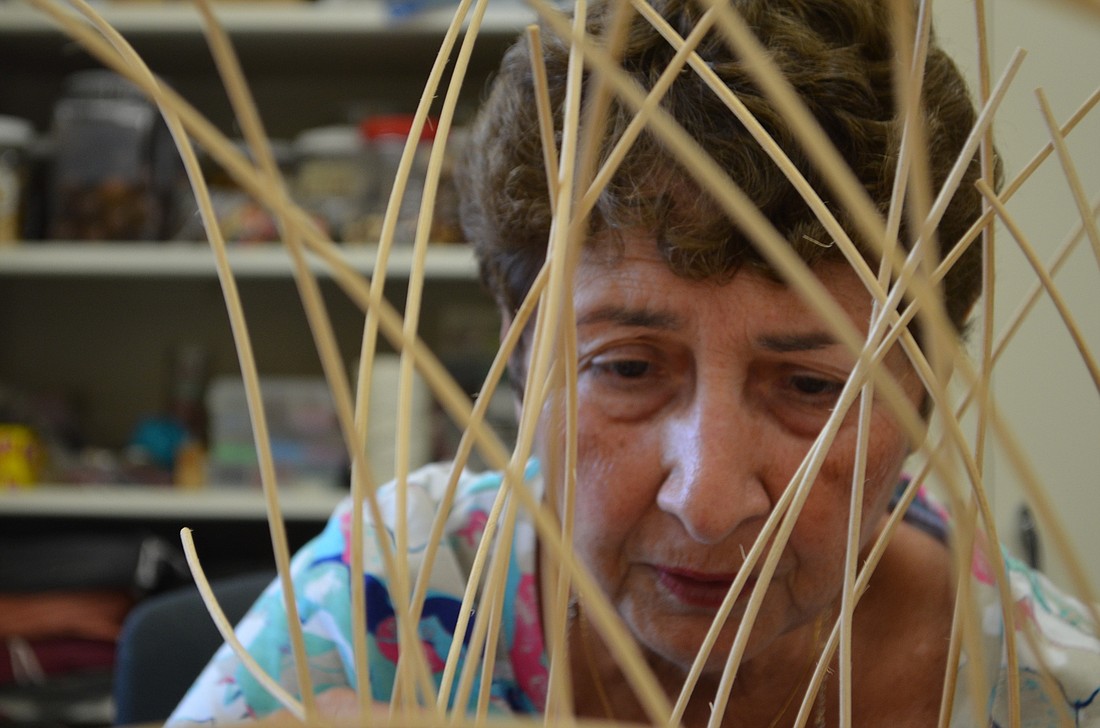- November 23, 2024
-
-
Loading

Loading

Frances Worman is soaking a skinny strand of pale blue reed in a bucket of water. If she doesn’t soak it well enough, the brittle strand will snap as she weaves it into a basket she is making for her daughter. The blue reed will alternate with a natural tone in a pattern.
But Worman, 75, isn’t sure what the design looks like, because she’s visually impaired. But that doesn’t stop her.
“I’m working by touch,” Worman said. “Whatever comes out comes out. We take out a lot of things out and redo them.”
Worman, who has glaucoma and has also had Stargardt disease, a form of inherited juvenile macular degeneration since she was 6, can feel the texture in the reed and weaves it on a wooden board to give the basket an oblong shape. She has been coming to the basket-weaving class for visually impaired and blind adults by ACE, or Adult & Community Enrichment, at Suncoast Technical College for five years.
Once a week, the class of about 12 students and four volunteers meets for three hours of weaving.
The atmosphere feels more like a social club than a classroom.
“They’re like a bunch of sisters in here joking around,” said instructor Tammy Butz, who helps students with tasks like tightening basket weaves and selecting colors. “When they’re done with a basket, they do like a lap around to show everyone and give feedback.”
For 30 years, ACE has maintained the class with funds from the Adults with Disabilities Program. When the funding was cut from the state budget last year, ACE worked to keep the class in session.
“This program is so important for those who attend it,” said Laura Trubac, ACE program manager. “It’s been part of their lives for some for more than 20 years.”
ACE programming is part of the Sarasota County School District but, unlike kindergarten through 12th grade programs, it does not have access to state tax dollars, although it uses classroom space at Suncoast Technical College. ACE programs require students to pay tuition and supply fees.
“We typically do not qualify for grants because we’re not a nonprofit,” Trubac said. “We’re part of the school district. Automatically we’re not even eligible to apply for different funding sources in the community because we’re cut off right at the knees.”
“We live in a sighted world. You lose a great deal when you lose your sight, and you feel isolated.”— Yvette Muir
The last season of classes has been funded through scholarships for students with funds from an art sale in December and a $1,000 donation, but the fate of the upcoming fall season is uncertain.
Trubac estimates the annual cost for the class is $9,000, which includes supplies, the instructor’s salary, tuition and supplies. In addition, students typically pay $5 for a roundtrip bus ride to and from campus because they are not able to drive.
Despite the uncertainty, students keep pursuing their hobby with enthusiasm.
Some students, like Yvette Muir, have made so much progress that they’ve won ribbons for their work at the Sarasota
County Fair. Muir, 86, won best of division this year for her basket, despite having only been in the class for a year.
Now, Muir is making a basket for each administrator at the Jefferson Center where she lives.
“At any age it’s nice to challenge yourself; I really think that is true with the visually impaired,” Muir said. “We live in a sighted world. You lose a great deal when you lose your sight, and you feel isolated.”
Many women in the class relate to these feelings. The class brings them together.
“It functions as a support group and builds self-esteem,” Trubac said. “Everyone who works here feels very passionately and protective of that class. What you hear in the hallway is the energy in that class.”